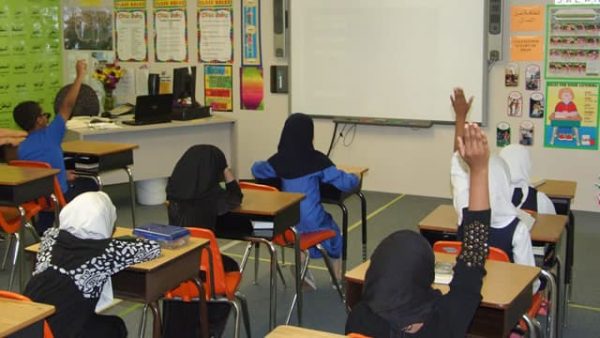Charlotte Islamic Academy lauds professor’s classroom consulting

A multi-year effort by Department of Educational Leadership Professor Debra Morris has significantly improved instruction and faculty development at the Charlotte Islamic Academy, according to that organization’s leadership.
The academy contacted Morris in 2012 to seek help with classroom observation and professional development. In the years since, she has led efforts to set up a beginning teacher’s support program and assisted the school in establishing a relationship with the North Carolina Department of Public Instruction to facilitate teacher licensure.
“Every exchange I’ve had with her over the years has shown that her priorities are teachers and students; they always come first,” said Zaynab Martin, a third grade teacher at the school and College of Education alumna, “She has gone above and beyond in making it a better place for teachers to teach.”
“The teachers are extremely receptive to feedback,” Morris said, “It has been rewarding to help them implement key areas of improvement.”
Started in the 2007, the Charlotte Islamic Academy is a private school located in Harrisburg; its enrollment numbers around 160 students. Like many small private schools, it faces resource challenges but places a premium on teaching.
“Maintaining quality classroom instruction is of the utmost importance to the overall success of the school and its mission and is what drives us as how we see our jobs, as a divine trust,” said Principal A.J. Lamti.
That commitment to quality instruction has been evident in faculty improvement, Morris noted.
“I see great progress, especially since they now have the beginning teacher support program, which is required for teachers to get their licenses renewed, and new teachers get mentors for support,” she said. “Now that teachers receive formal evaluations, they embrace the feedback in all of the areas.”
Lamti said faculty interaction with Morris, a proven educational consultant in local school systems, has driven more nuanced personal reflections on classroom approaches.
“She shares another viewpoint and perspective that drives the teachers to dig even deeper into thinking about their practices,” he said.
And while Morris was originally sought to consult on instructional practices, her work at the school has moved beyond that. She has helped the academy set up site visits to other schools to observe different teaching schools, something Morris said is especially important because the school’s small size limits collaboration opportunities for teachers. The faculty has expanded this concept into the area of cross-cultural collaboration and exploration. An English teacher recently invited students from a nearby Catholic school to visit the academy and meet with their peers, and Charlotte Islamic Academy students made a reciprocal visit. Another teacher set an in-class Skype call with students in a Rwandan village to discuss the impact of genocide.
Yet among the new programs and curriculum improvement, Principal Lamti said it’s Morris’ personal touch that surprised him most.
“We weren’t expecting someone that would be so personally invested in our school,” he said. “Dr. Morris has shown that she cares about each staff member as a person, with quirks and issues different from the rest which doesn’t influence her assessment of their job performance.”
Martin, the third grade teacher, said she witnessed this firsthand as Morris chipped in to help a teacher pay to fix a flat tire.
It’s been a valuable experience for Morris, too. She says she has learned a great deal about Islamic culture and community — lessons she takes back to UNC Charlotte.
“We have to create a culture of caring in the school and work to dispel stereotypes and bridge differences so that students and teacher have empathy for others,” Morris said, “I share what I learn from my work here with my aspiring school leaders and work to help them understand the importance of their work in the lives of those in the school building. It is about more than academics.”